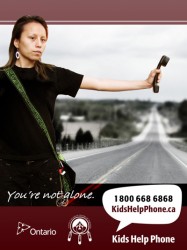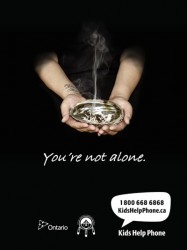Article Origin
Volume
Issue
Year
Kids Help Phone has launched its newest poster campaign designed for Aboriginal youth with a message from Aboriginal youth: You’re not alone.
It’s a simple and poignant message displayed on the new posters which better reflects Aboriginal youth than the previous generic posters from Kids Help Phone.
The organization not only released new posters, but has also been working on improving service to Aboriginal youth.
The new campaign, entitled Building Capacities to Better Support Aboriginal Youth, came out of meetings with Aboriginal youth throughout the province, including northern communities, over the past year. The organization partnered up with the Native Canadian Centre of Toronto to invite youth to help shape a new awareness campaign.
In spring 2011, the organization received a grant from the province to enable a team of counselors to visit five communities, including Moose Factory, Serpent River, Toronto, Thunder Bay and Kettle and Stoney Point. The intention of the trips was to gain a deeper understanding of the realities that Aboriginal youth have to face.
On the Moose Factory trip, Kristen Buckley, Knowledge Coordinator at Kids Help Phone, said Kids Help Phone posters were displayed on the walls for the attending youth. They wanted feedback from youth about the posters.
Buckley said the kids gave positive criticism, directing members to possibly include more items to posters that would have meaning to Aboriginal youth.
But one comment really stuck with Buckley while she was there. One particular poster from a previous year’s campaign included a tubular slide with a phone cord going up through it.
“A youth from Kasheshewan told me that poster really wasn’t relevant to him because in his community they didn’t even have a playground.”
It’s the small things that matter when reaching out to Aboriginal youth. Buckley said she also learned that even though there are negative stereotypes about First Nation communities in media which sensationalize the poverty and remoteness of some of the communities, First Nations youth are very proud of who they are and where they come from.
Buckley said all members from the organization based in Toronto and Montreal attended cultural sensitivity workshops to be better prepared to counsel Aboriginal youth.
Springwater Hester-Meawassige is the Healthy Communities Project Assistant with Kids Help Phone and was based at the Native Canadian Centre in Toronto. In a June telephone interview, Hester-Meawassige said the work to improve services to Aboriginal youth came from the phone counselors themselves.
She said, “The Healthy Communities project was an initiative from the counselors and was meant to properly equip the counselors to better respond to their Aboriginal callers and do more outreach with the Aboriginal community so that more Aboriginal youth are aware of the services provided at the agency.”
Buckley said youth wanted counselors to basically understand the context of their reality on reserve.
“A lot of times, counselors may suggest a service in their community that they could go seek face to face assistance.” It was important for young people to express that they may not have access to the same services that would be available in cities.
Another thing the youth stressed is that they liked the anonymity Kids Help Phone provides them. Buckley said anonymity is not always available for youth living in a small community.
With the new knowledge and collaboration with Aboriginal youth, the Native Canadian Centre and the National Aboriginal Health Organization, Kids Help Phone hopes to reach out more effectively now to Aboriginal youth.
The posters have been sent out to select communities. Nine posters were designed by the youth, and were promoted online where voting determined the winning images. All nine posters can be viewed on the Kids Help Phone Web site at www.kidshelphone.ca.
The winning poster depicts a young woman holding out a phone while standing near a road, and the runner-up poster depicts someone smudging.
Buckley said posters and promotional materials can be ordered by any community.
- 5066 views


